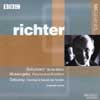Mussorgsky Pictures at an Exhibition
Treasurable performances restored on CD
View record and artist detailsRecord and Artist Details
Composer or Director: Robert Schumann, Claude Debussy, Modest Mussorgsky
Genre:
Instrumental
Label: BBC Music Legends/IMG Artists
Magazine Review Date: 12/2002
Media Format: CD or Download
Media Runtime: 72
Mastering:
Mono
ADD
Catalogue Number: BBCL4103-2

Tracks:
| Composition | Artist Credit |
|---|---|
| Bunte Blätter |
Robert Schumann, Composer
Robert Schumann, Composer Sviatoslav Richter, Piano |
| Pictures at an Exhibition |
Modest Mussorgsky, Composer
Modest Mussorgsky, Composer Sviatoslav Richter, Piano |
| (6) Images, Movement: Cloches à travers les feuilles |
Claude Debussy, Composer
Claude Debussy, Composer Sviatoslav Richter, Piano |
Author: Bryce Morrison
Occasionally one hears performances in the concert hall which create a haunting and indelible memory sadly unrecorded. That is until BBC Legends delved into its archive and made such memories live again in all their first glory. Richter’s 1968 Goldsmith’s Hall recital included Schumann’s Bunte Blätter, one of his most troubled and neglected masterpieces and although many pianists break off their performance after the first eight pieces, doubtless puzzled by the oddity and obscurity of what follows, Richter revels in the opportunity to explore a ‘Novelette’ with its sinister chromatic undertow (central section), No 10 with a swirling prophecy of Rachmaninov, and a finale which blends gaiety and savagery and which brings one to the very edge of darkness and Schumann’s tragic schizophrenia.
Richter for long made a speciality of this work and his performance is a consummate reflection of its mood-swings: vivid yet never intrusive. Every repeat is lovingly observed, his very measured touch in the waltz of No 6 shadowed by the painful progression of No 7, the startling progression of ideas in the following numbers given with an eloquence that declares his special sympathy for Schumann in every outlandish bar.
The Mussorgsky, too, is pure Richter, the pulse fluid rather than rigid, the temptation towards heavily personalised virtuosity (as with Horowitz, for example) scrupulously avoided. Indeed, the entire performance is permeated with an unusual degree of inwardness and poetry, the trio from ‘Ballet of the Unhatched Chicks’ of the rarest delicacy, the flickering half-lights of ‘Cum mortuis in lingua mortua’ evoked with an uncanny degree of repose. Again, the final pages may have all the necessary magisterial power but they never become, as they so often do, an unrelenting barrage of fortissimo.
Finally, as an encore, there is Richter’s Debussy, in many ways as arresting and revelatary as his Schubert. Here the funeral bells toll from All Saints Day to All Souls Day, their chime resolved in a final spiral of the most subtle and potent melancholy. Richter’s love of such confidentiality and enigma could hardly be more persuasively shown. The recorded sound has come up well and three fine photographs of the pianist are included. This is an invaluable issue.
Richter for long made a speciality of this work and his performance is a consummate reflection of its mood-swings: vivid yet never intrusive. Every repeat is lovingly observed, his very measured touch in the waltz of No 6 shadowed by the painful progression of No 7, the startling progression of ideas in the following numbers given with an eloquence that declares his special sympathy for Schumann in every outlandish bar.
The Mussorgsky, too, is pure Richter, the pulse fluid rather than rigid, the temptation towards heavily personalised virtuosity (as with Horowitz, for example) scrupulously avoided. Indeed, the entire performance is permeated with an unusual degree of inwardness and poetry, the trio from ‘Ballet of the Unhatched Chicks’ of the rarest delicacy, the flickering half-lights of ‘Cum mortuis in lingua mortua’ evoked with an uncanny degree of repose. Again, the final pages may have all the necessary magisterial power but they never become, as they so often do, an unrelenting barrage of fortissimo.
Finally, as an encore, there is Richter’s Debussy, in many ways as arresting and revelatary as his Schubert. Here the funeral bells toll from All Saints Day to All Souls Day, their chime resolved in a final spiral of the most subtle and potent melancholy. Richter’s love of such confidentiality and enigma could hardly be more persuasively shown. The recorded sound has come up well and three fine photographs of the pianist are included. This is an invaluable issue.
Discover the world's largest classical music catalogue with Presto Music.

Gramophone Digital Club
- Digital Edition
- Digital Archive
- Reviews Database
- Full website access
From £8.75 / month
Subscribe
Gramophone Full Club
- Print Edition
- Digital Edition
- Digital Archive
- Reviews Database
- Full website access
From £11.00 / month
Subscribe
If you are a library, university or other organisation that would be interested in an institutional subscription to Gramophone please click here for further information.




